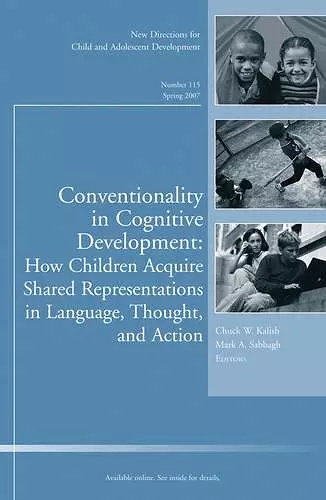Conventionality in Cognitive Development: How Children Acquire Shared Representations in Language, Thought, and Action
New Directions for Child and Adolescent Development, Number 115
Charles W Kalish editor Mark A Sabbagh editor
Format:Paperback
Publisher:John Wiley & Sons Inc
Published:18th Apr '07
Currently unavailable, and unfortunately no date known when it will be back

An important part of cognitive development is coming to think in culturally normative ways. Children learn the right names for objects, proper functions for tools, appropriate ways to categorize, and the rules for games. In each of these cases, what makes a given practice normative is not naturally given. There is not necessarily any objectively better or worse way to do any of these things. Instead, what makes them correct is that people agree on how they should be done, and each of these practices therefore has an important conventional basis. The chapters in this volume highlight the fact that successful participation in practices of language, cognition, and play depends on children's ability to acquire representations that other members of their social worlds share. Each of these domains poses problems of identifying normative standards and achieving coordination across agents. This volume brings together scholars from diverse areas in cognitive development to consider the psychological mechanisms supporting the use and acquisition of conventional knowledge. This is the 115th volume of the quarterly report series New Directions for Child and Adolescent Development.
ISBN: 9780787996970
Dimensions: 228mm x 152mm x 7mm
Weight: 160g
112 pages